Jobs for Gamers: Turning Your Passion into a Career
Video games have come a long way from being just a hobby. Today, they offer exciting career opportunities for those who love gaming. From game design to esports, the gaming industry is full of jobs that let you turn your passion into a profession.
Jobs for gamers range from game developers and designers to esports coaches and professional players. These roles tap into different skills and interests within the gaming world. Some jobs focus on creating games, while others involve playing or analyzing them.
The gaming industry keeps growing, creating new job openings all the time. This means more chances for gamers to find work they love. Whether you’re into coding, art, or strategy, there’s likely a gaming job that fits your skills.
Key Takeaways
- The gaming industry offers diverse career paths for people with different skills and interests.
- Education requirements vary, with some roles needing degrees while others value experience and skills.
- The job market in gaming is growing, creating new opportunities for passionate gamers.
The Gaming Industry Landscape
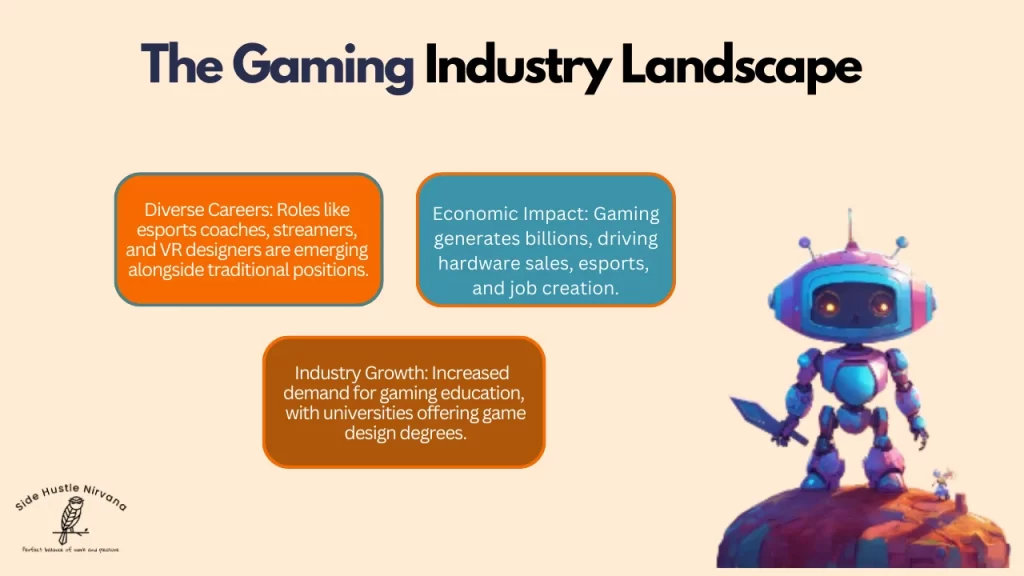
The gaming industry has grown rapidly, creating diverse career paths and significant economic impact. New technologies and gaming formats have expanded job opportunities beyond traditional roles.
Evolution of Gaming Careers
Jobs for gamers now span a wide range of fields. Game development has evolved from small teams to large studios with specialized roles.
Traditional positions like programmers and artists remain crucial. New careers have emerged, such as:
- Esports coaches
- Game streamers
- Virtual reality designers
- Mobile game developers
The rise of indie game development has also created opportunities for solo developers and small teams to make their mark.
The Economic Impact of Gaming
The gaming industry has become a major economic force. It generates billions in revenue annually, surpassing other entertainment sectors.
Video game careers contribute significantly to job creation. Large game studios employ thousands, while indie developers fuel innovation.
Gaming’s impact extends beyond direct employment. It drives:
- Hardware sales
- Streaming platforms
- Esports tournaments
- Gaming merchandise
This growth has led to increased investment in gaming-related education and training programs. Universities now offer degrees in game design and development, preparing students for careers in this thriving industry.
Career Pathways for Gamers
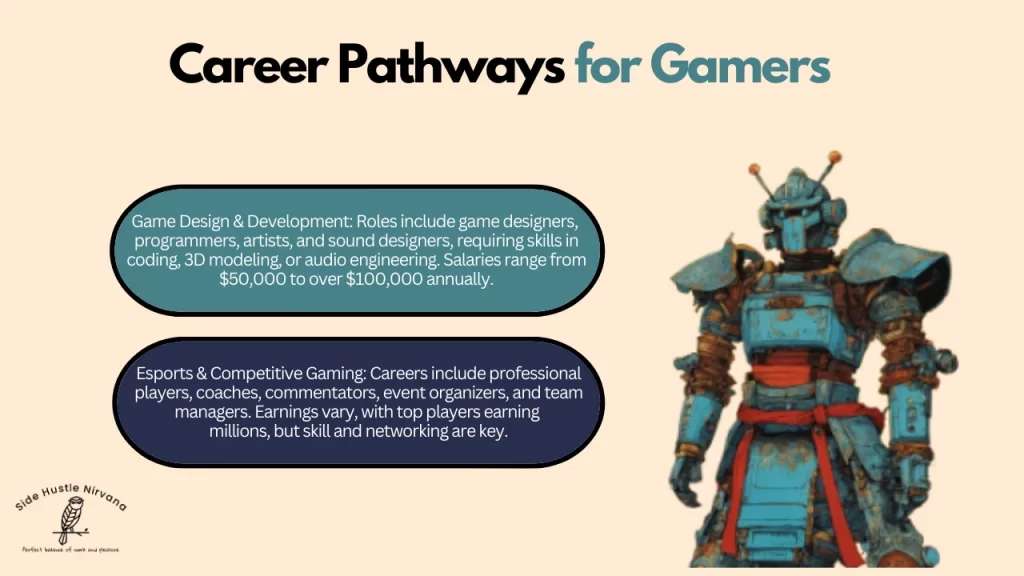
Gamers can turn their passion into exciting and rewarding careers. The gaming industry offers diverse opportunities for those with skills and enthusiasm for video games.
Passionate about gaming? Transitioning to a career as a video game tester can be the perfect step toward working full-time in this dynamic industry.
Game Design and Development
Game designers and developers create the games that millions enjoy. They work on all aspects of game production, from initial concept to final product. Jobs for video gamers in this field include:
- Game Designer: Crafts game concepts, rules, and mechanics
- Programmer: Writes code to bring games to life
- Artist: Creates visual elements like characters and environments
- Sound Designer: Produces audio effects and music
These roles often require technical skills in areas like coding, 3D modeling, or audio engineering. Many game companies look for candidates with degrees in computer science, art, or game design.
Salaries in game development vary widely. Entry-level positions may start around $50,000, while experienced professionals can earn over $100,000 annually.
Esports and Competitive Gaming
The rise of esports has created new career opportunities for gamers. Professional players compete in tournaments for large cash prizes. But playing isn’t the only path in esports:
- Coach: Trains and guides esports teams
- Commentator: Provides live commentary during matches
- Event Organizer: Plans and manages esports tournaments
- Team Manager: Handles business operations for pro teams
Many of these roles don’t require formal education. Skills like game knowledge, communication, and leadership are often more important.
Earnings in esports can be unpredictable. Top players and personalities may make millions, while others earn more modest salaries. The growing industry offers potential for those willing to work hard and network effectively.
Educational Requirements and Skills
Getting a job in gaming needs education, technical know-how, and people skills. These are key for success in this fast-paced field.
Formal Education and Training
Many gaming jobs ask for a college degree. Bachelor’s degrees in computer science, game design, or software engineering are common. Some schools offer special game development programs.
These programs teach coding, game theory, and design basics. Students learn to use important tools like Unity or Unreal Engine.
Short courses and bootcamps can also help. They focus on specific skills like 3D modeling or game writing. Online classes are a good way to learn new skills or stay current.
Necessary Technical Expertise
Technical skills are vital for most gaming jobs. Programmers need to know languages like C++, Java, or Python. Artists should master 3D modeling software and digital art tools.
Game designers must understand game mechanics and level design. Knowledge of VR and AR tech is becoming more important.
Networking skills are crucial for online gaming jobs. Understanding how to create stable online platforms is key.
Soft Skills and Adaptability
Gaming jobs need more than just tech skills. Teamwork is a must. Most projects involve working with others.
Good communication helps share ideas clearly. Creative thinking leads to new game concepts. Problem-solving skills help fix bugs and improve gameplay.
The gaming world changes fast. Being able to learn new things quickly is important. Patience and attention to detail help make games better.
Critical thinking skills are useful in many gaming roles. They help in designing game logic and solving complex issues.
Beyond traditional jobs, some gamers earn by showcasing their skills online. Check out how to make money streaming video games to build your presence and income.
Career Advancement and Growth
The gaming industry offers many paths for professional growth. Gamers can advance their careers through networking, community involvement, and ongoing education. These strategies help build skills and open new opportunities.
Networking and Community Involvement
Networking is key in the gaming world. Gamers can join online forums and attend gaming events to meet industry pros. These connections may lead to job offers or insider tips. Local gaming groups and clubs are great for meeting like-minded people.
Social media platforms help gamers build their brand. Sharing game tips or reviews can attract followers. This can lead to partnerships with game companies. Some gamers become influencers, earning money through sponsorships.
Volunteering at gaming events is another way to network. This gives hands-on experience and face time with industry leaders. It’s a chance to show skills and work ethic.
Continuing Education and New Technologies
The gaming industry changes fast. Staying current with new tech is crucial for career growth. Online courses in game design or programming can boost skills. Many are free or low-cost.
Game developers often need to learn new coding languages. Workshops and bootcamps teach these skills quickly. They also look good on resumes.
Virtual reality and augmented reality are growing fields. Learning about these techs can open new job options. Game testers who know AR/VR are in high demand.
Certifications in game development tools are valuable. They prove expertise to employers. Popular certs include Unity and Unreal Engine.
Job Market Trends in Gaming
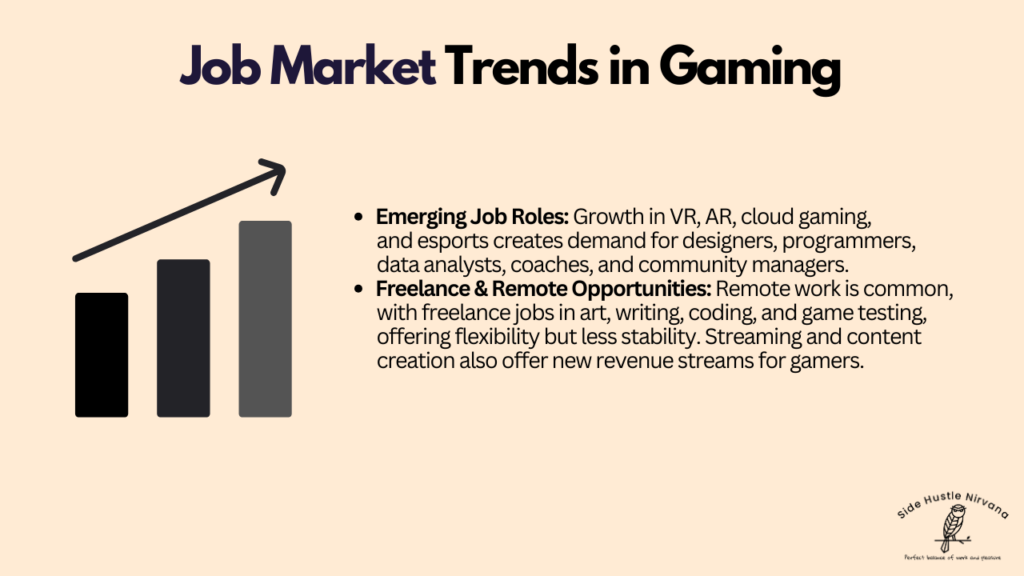
The gaming industry is growing fast. New jobs are popping up as technology changes. Many roles now let people work from home or as freelancers.
Emerging Job Roles
Game companies are looking for people with new skills. Virtual reality (VR) and augmented reality (AR) jobs are on the rise. They need designers and programmers who know these technologies.
Cloud gaming is also creating jobs. Companies want experts in streaming and online services. Data analysts are in high demand too. They help make games better by looking at how people play.
Esports is another growing area. Teams need coaches, managers, and event planners. Game companies are also hiring more community managers. These people talk to fans online and keep them happy.
Freelance and Remote Opportunities
Working from home is now common in gaming. Many jobs can be done anywhere with a good internet connection. This opens doors for people all over the world.
Freelance work is growing too. Artists, writers, and coders often work on short projects. This gives them freedom but can be less stable than full-time jobs.
Game testing is a popular remote job. Testers play games to find bugs before release. Some companies even let testers work part-time from home.
Streaming and content creation are also big. While not traditional jobs, many gamers make money this way. They play games online and build a following.
Creating a Personal Brand in Gaming
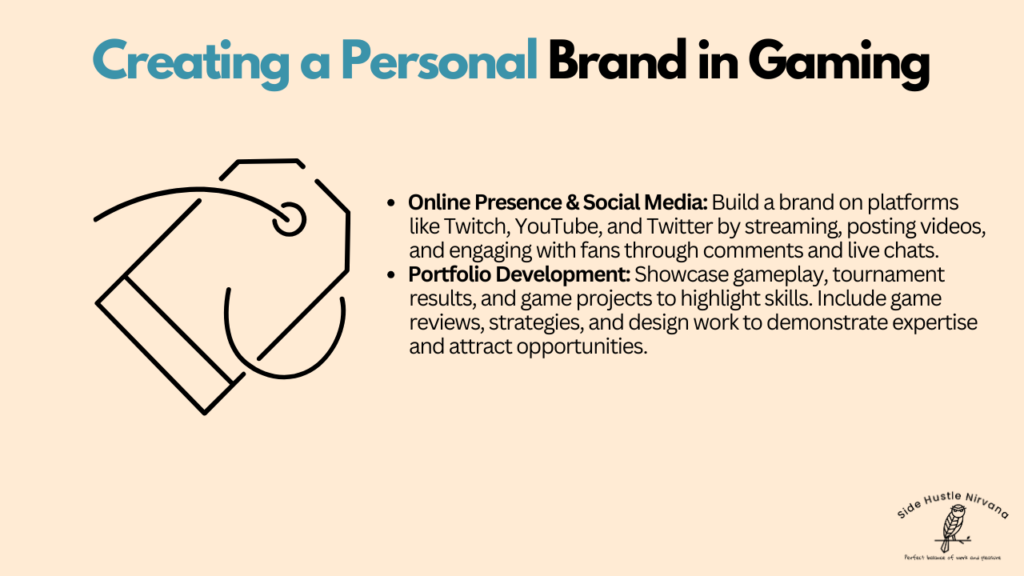
Building a strong personal brand in gaming opens doors to exciting career opportunities. It helps gamers stand out in a competitive field and showcase their unique skills and personality.
Online Presence and Social Media
Gamers can build their brand by creating profiles on popular platforms like Twitch, YouTube, and Twitter. Regular streaming and posting gameplay videos helps grow a following. Interacting with fans through comments and live chats builds a community.
Engaging your audience is key to brand growth. Responding to messages and creating polls keeps followers invested. Collaborating with other gamers expands reach and brings in new fans.
Consistency in branding across platforms is important. Using the same username, profile picture, and style helps fans recognize you easily.
Portfolio Development and Showcasing
A strong portfolio highlights a gamer’s best work and skills. It should include clips of impressive gameplay, tournament results, and any game-related projects.
For aspiring game developers or artists, including examples of levels, characters, or artwork is crucial. Detailing roles in game projects shows teamwork and technical skills.
Creating content like game reviews or strategy guides displays knowledge and expertise. This can lead to opportunities in game journalism or coaching.
Keeping the portfolio updated with recent achievements and projects is essential. It shows growth and dedication to potential employers or sponsors.
Workplace Culture in the Gaming Industry
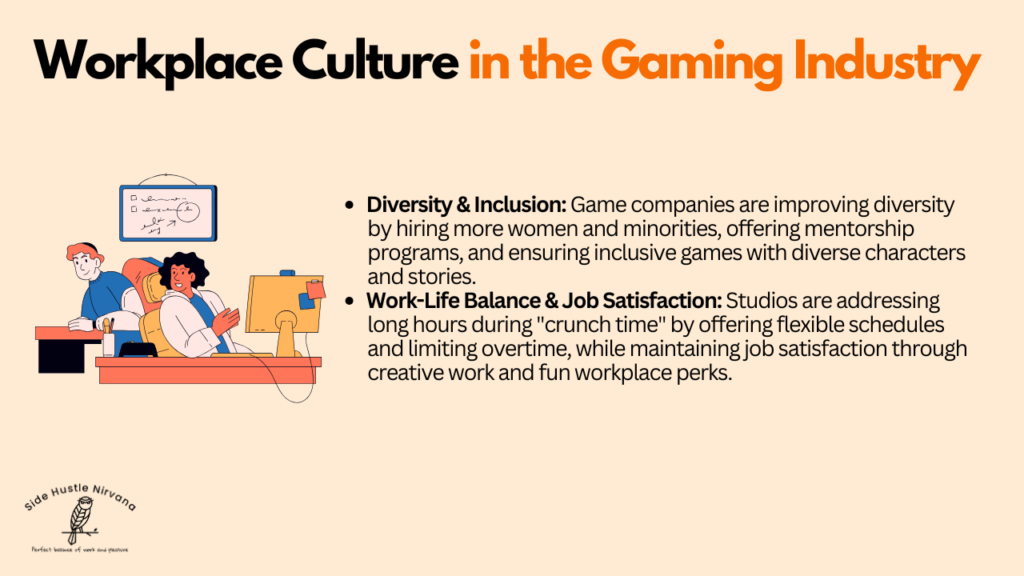
The gaming industry has a unique workplace culture shaped by creativity, technology, and passion. It faces challenges in diversity and maintaining a healthy work-life balance for employees.
Diversity and Inclusion Initiatives
Game companies are working to improve diversity. Many have set goals to hire more women and minorities. Some firms offer mentorship programs for underrepresented groups.
Training on bias and inclusion is becoming common. Studios are also reviewing their games to ensure diverse characters and stories.
Employee resource groups help create a sense of community. These groups often focus on women, LGBTQ+, and racial minorities in gaming.
Progress is slow but steady. The industry still has work to do to match the diversity of its player base.
Work-Life Balance and Job Satisfaction
Game development can involve long hours, especially near release dates. This “crunch time” has been a major issue in the industry.
Some studios are trying to improve this. They’re setting stricter limits on overtime and offering more flexible schedules.
Job satisfaction in gaming can be high due to the creative nature of the work. Employees often feel proud to see their games enjoyed by millions.
Perks like game rooms and relaxed dress codes are common. These aim to create a fun, creative atmosphere.
However, job security can be a concern. The industry sometimes goes through cycles of layoffs and hiring.
Frequently Asked Questions
Gamers have many options to turn their passion into a career. Jobs range from game development to professional esports, with opportunities for both full-time and part-time work.
What kind of job can a gamer get?
Gamers can pursue careers as game developers, testers, or designers. Other options include esports player, coach, or commentator.
Some gamers find work as streamers or content creators. Technical roles like programmer or 3D artist are also available in the gaming industry.
How can I turn gaming into a career?
To turn gaming into a career, develop skills relevant to the job you want. For game development, learn coding languages and game engines.
For esports, practice and compete in tournaments. Build a following on streaming platforms for content creation careers. Networking and internships can help you break into the industry.
Can I get a job playing video games?
Yes, it’s possible to get a job playing video games. Professional esports players compete in tournaments for prize money and salaries.
Game testers play games to find bugs and improve gameplay. Streamers and content creators can earn money by playing games for an audience.
What are some entry-level jobs for gamers?
Entry-level jobs for gamers include quality assurance tester and customer support representative for gaming companies. Junior game designer or programmer positions are available for those with relevant skills.
Community manager roles help engage with player bases. Esports team assistants support professional players and coaches.
Are there part-time positions suitable for gamers?
Yes, many part-time positions suit gamers. Streaming and content creation offer flexible hours. Some game testing jobs are part-time or contract-based.
Esports coaching or commentating can be done part-time. Gaming cafes and retailers often hire part-time staff with gaming knowledge.
How can gamers find remote job opportunities?
Gamers can find remote jobs on gaming industry job boards and general remote work websites. Many game development and testing roles offer remote options.
Streaming and content creation are naturally remote. Some esports organizations hire remote analysts and support staff. Networking on social media and gaming forums can lead to remote opportunities.







